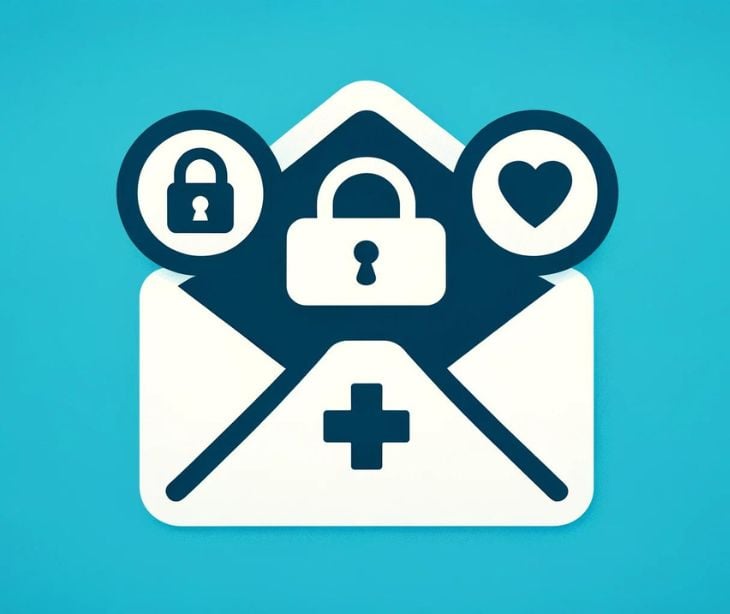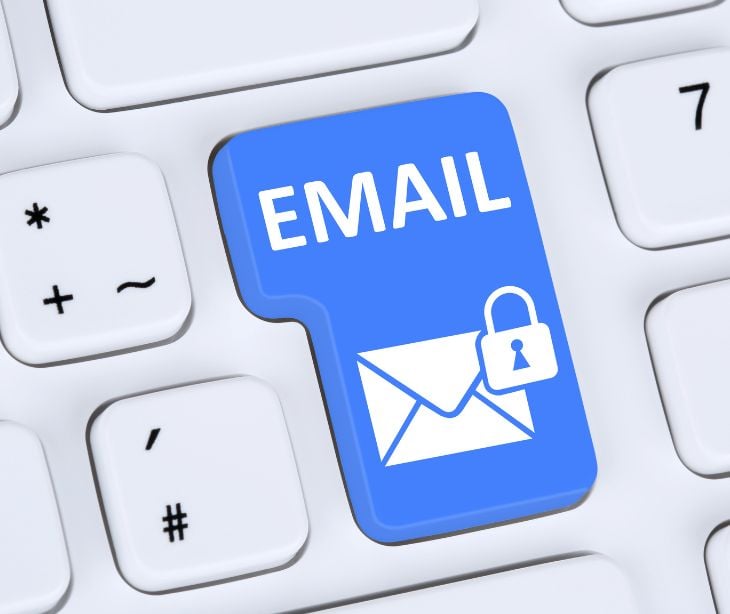2 min read
Top 5 features to look for in a HIPAA compliant email service provider
Liyanda Tembani
April 08, 2024

HIPAA compliant email ensures the secure exchange of sensitive patient information while maintaining compliance with HIPAA regulations. The top five features to look for in a HIPAA compliant email service include automatic encryption to safeguard data during transmission and storage, a willingness to sign a business associate agreement (BAA) to ensure HIPAA compliance, robust access controls to limit access to PHI, detailed audit logging and tracking to monitor user activity and detect potential security breaches, and data loss prevention (DLP) measures to prevent accidental disclosure of PHI.
What are the HIPAA requirements for email communication?
HIPAA doesn't directly address email but has strict guidelines for communication involving protected health information (PHI). It requires encryption and access controls to protect data integrity, patient consent for electronic communication, maintenance of audit logs, and adherence to HIPAA's Privacy and Security Rules. Healthcare providers must choose email service providers offering features compliant with these HIPAA requirements to ensure secure PHI exchange and regulatory adherence.
Read more: Rules for HIPAA compliant email communications
What to look out for in HIPAA compliant email providers
Automatic encryption
Automatic encryption ensures that all outgoing emails and attachments are encrypted by default without requiring manual intervention. With encryption methods like 256-bit AES, automatic encryption protects PHI during transmission and storage, minimizing the risk of data breaches and unauthorized access. That allows for more personalization and marketing as healthcare professionals know that PHI remains protected, which increases patient engagement. HIPAA compliant email marketing can lead to open rates of over 50% when personalized because it allows for patient engagement through email.
Read more: What happens to your data when it is encrypted?
Business associate agreement (BAA)
When selecting an email service provider, establish a business associate agreement (BAA) to ensure its HIPAA compliance. A BAA is a legally binding contract that clarifies each party's responsibilities for protecting PHI. By choosing an email service provider willing to sign a BAA, you can demonstrate your commitment to patient privacy and ensure compliance with HIPAA regulations.
Access controls
Access controls restrict access to emails containing PHI and avert unauthorized disclosure of sensitive data. HIPAA compliant email services provide access control features, like multi-factor authentication, role-based access controls (RBAC), and activity logs. Multi-factor authentication requires users to provide multiple forms of verification, strengthening the security of email accounts. RBAC assigns specific permissions based on users' roles, ensuring only authorized individuals can access PHI. Activity logs track user interactions with PHI, enhancing transparency and accountability.
Audit logging and tracking
HIPAA compliant email services maintain comprehensive audit logs that record user interactions with PHI. These logs include details such as login activities, access attempts, and any alterations made to sensitive information. Audit logs serve as invaluable evidence of compliance efforts by providing this detailed record of activity.
Data loss prevention (DLP)
Data loss prevention (DLP) features can prevent accidental or unauthorized disclosure of PHI. HIPAA compliant email services should offer DLP capabilities to scan email content for sensitive information, such as PHI, and apply rules to prevent unauthorized transmission or sharing of this data. Additionally, DLP features may include functionalities like policy enforcement for email forwarding and copying, quarantine capabilities for suspicious emails, and alerts for potential breaches.
FAQs
Are there specific retention requirements for audit logs of email activity in HIPAA compliant email services?
While HIPAA does not prescribe specific retention periods for audit logs of email activity, healthcare organizations should establish their own retention policies based on factors such as regulatory requirements, operational needs, and risk management considerations.
Can healthcare providers use popular email platforms like Gmail or Outlook for transmitting PHI if they enable encryption?
Using popular email platforms for transmitting PHI may be permissible if appropriate security measures, including encryption, are implemented to safeguard the data. However, healthcare providers must ensure that these platforms comply with HIPAA regulations.
Can healthcare organizations use email forwarding features to transmit PHI under HIPAA regulations?
Healthcare organizations may use email forwarding features for transmitting PHI within their organization, provided that appropriate security measures are in place to safeguard the data. This includes ensuring that email forwarding settings are configured to maintain encryption and access controls and that employees are trained on the proper handling of PHI to prevent unauthorized disclosure.
Subscribe to Paubox Weekly
Every Friday we'll bring you the most important news from Paubox. Our aim is to make you smarter, faster.



